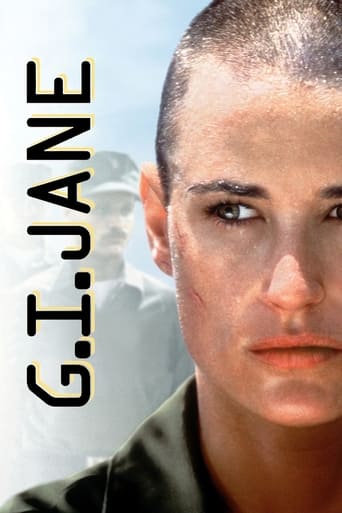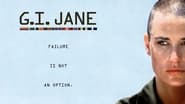FamousGirlfriend
Jordan O'Neill (Demi Moore) is selected to be one of the test subjects in an attempt to explore the possibility to change the policies for women in the navy. Unsurprisingly, there's more than one agenda in the mix.Yes, this is kind of a flat film. Yes: it has flaws. Yes, it's ridiculously predictable. But do I love this film or what? It's one of my dearest feel good films of all time. I think Ridley Scott managed to capture a few real issues in a film that is essentially an amusing and very simple story. The actors do a great job and the story is straightforward, I think it is all it was intended to be.Also, they beat each other up and there are helicopters and explosions.***SPOILERS and annoyingly large wall of text below!***The gender issue is so apparent it might as well be a joke, and in a lot of cases it is! Symbolic references to genitals everywhere. Maybe that's why it works so well. You want the jokes and extreme symbolism. And the helicopters and the violence.There are two powerful women in this film, both of them are trying to make it, but while being a woman is part of the strategy for one of them, being treated as a person rather than a woman is vital for the other. DeHaven is trying to make a feminist statement as part of a (not so clean) political campaign, Jordan just tries to do what she wants in life, despite being a woman.Jordan is victimised and diminished by basically all people around her, DeHaven being the most cruel of them all. At least C.O. Salem is honest. Even her partner is trying to hold her back to some extent, though he comes to respect her decision in the end. But Jordan never considers herself a victim and doesn't for one minute feel sorry for herself. There is just critique and hopeless idiocy in a lot of the characters' reasoning: 1) Women in combat isn't a yes/no decision, because it IS true that men tend to become more protective towards women, and that IS problematic in a war situation (I just read a book on this, so I feel comfortable stating this). Ideology and reality have a tendency to clash. But this doesn't mean that we can't change this: by the time this film came out the policies for women were different from they are now, so apparently we are getting somewhere. 2) There is always someone who decides what is and what isn't politically correct, and while striving for equality, what is important and what is just for show? Does forcing "gender education" upon someone really make a difference or is it just antagonising? Even if I thoroughly dislike the character C.O. Salem and all his opinions, I get where he's coming from and it's not only the 50s.How can we strive for equality when there are still people using their gender as justification or means to succeed? How can we look past "gender norms" when we are the ones upholding and creating them? And why are people not judged by what they bring to the table, when that should be the only thing that matters?
OllieSuave-007
This is the female version of G.I. Joe, where Demi Moore plays Jordan O'Niell, a female trainee in the US Navy who is sent to the SEAL/C.R.T. selection program. There, O'Neill endures a grueling and inhumanly punishing regime, but is determined to stay put and prove to everyone that she is capable of completing her training and is worthy of her spot in the Navy program.Moore played the part pretty well, pulling off the macho role convincingly and proved she is a strong person to stand up to her all-male peers. Viggo Mortensen played the tormenting Chief John James Urgayle well - cunning, vicious and villainous. The rest of the cast consisted of the male officers, who also pulled off pretty convincing military roles. Them doubting O'Niell's ability to join the Navy and mocking her determination provided some intrigue in the movie. The scenes of the officers having to dig through food scraps from garbage bins for dinner and them listening to boring music while taking a test late at night were haunting.The movie has a pretty fast moving plot and a nice touch of action, albeit some scenes were too gritty and over-the-top in my opinion, and much of the cinematography and visual were too dark. But overall, it's not a bad film; makes you feel the pain and grueling process of being in the military.Grade B-
jcmann01
The Whole Concept Addressed: This movie must have been put out by some feminist organization trying to promote women in the military into more combat positions. Personally, I don't mind women in the military, but I am against women directly in combat. It's nasty business and no woman should be slinging a gun, going toe and fist; knife in hand on a combat field only to get captured, raped, and tortured by the enemy. What woman in her right mind would want to do this anyway? As for the plot; it was so glamorized by Hollywood & unrealistic, I laughed. Real SEAL CRT Training has little resemblance to the way it is portrayed in this movie. However, the movie keeps you entertained, esp with HOTTIE, Demi Moore. I would say it is worth seeing.A Better alternative to this movie: Act of Valor is about real Navy SEALS in action. Now that is a good movie!
david-sarkies
The first thing that I heard about this movie was that the US Navy was opposed to making it and was very resistant to allowing Scott to use any of their facilities. I don't know what happened in the end but they seemed to be using some pretty hi-tech weaponry. One just doesn't walk down to a corner store and buy an Apache, though I thought the Apache was being used very ineffectively in the situation. Basically the Navy Seals were being pursued by a Lybian border patrol and they were on foot, so the Apache was firing missiles. I would have used the chain gun because it is much more effective against infantry than missiles, missiles are for tanks and other vehicles.G.I. Jane is a protest movie and it is about women in the military in front line jobs. The Navy Seals are said to be the best of the front line troops and thus we focus on this. The movie is much more political and deals a lot with the political ramifications of what is going on. The biggest protest here is that nobody wants to bring women home in body bags. What the women say is that they can do anything that a man can do, so if a man can be a front line soldier, then a woman should be as well. Starship Troopers actually has women as front line soldiers. We see the main character wanting to be treated like all the other men, but at first she is given help because they feel that she needs it. What she doesn't want is to be treated any differently. The is opposition to what she is doing but it doesn't come out as strong as it did in the previews. In the previews we are led to believe that everywhere she goes she faces opposition, but this is not true. People do try to persuade her from doing it, but she is stubborn and continues.It is the political side of the movie that draws the criticism. The politicians say that they don't want women coming home in body bags. The whole idea is about change and people don't want to do it. Feminisim is a very strong force in today's society and now we are moving further into what originally were male only jobs. Today we see women weightlifters and labourers, but we still don't see women soldiers. In Australia we have women on the naval ships but not in infantry. Now, in this movie, we see the beginnings of a protest against this.The movie itself was a little confusing at times because the characters seem to mumble and it was hard to concentrate with Louisa and Melissa doing their usual girly things behind me, but that was not Ridley Scott's fault. His dark, wet style is very evident here, though it is quite different to Burton's style. Scott focuses more on this protest, and his darkness is much more realistic. Scott seems to keep the movie dark as a symbol of this world where women are not free to do what they like. Scott also seems to like rain because it is raining a lot in this movie. This seems to symbolise the struggle that the soldiers are going through in the training.The training is very hard, and Scott reminds us of this constantly. They eat from bins and go through training to handle torture and capture. They are beaten up, drowned, and pushed to the limit. They say that there is a 60% dropout rate, and most of them want Jane to do it, but she doesn't. She makes it through a large part of the course only to become a political embarrassment.









